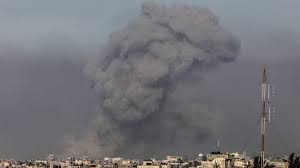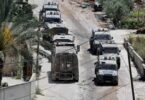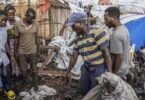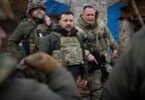Monitoring Desk
GAZA: Israeli forces have dropped leaflets in the southern Gaza Strip, asking residents to provide information about the captives taken by Hamas on October 7, as bombardment of the besieged enclave continues.
The leaflets dropped on Saturday, showed the photos of dozens of captives still in Gaza, together with a message suggesting there would be benefits for anyone providing information to Israel.
“You want to return home? Please report if you identified one of them,” read the message, which also listed a phone number and a link to a website containing images and names of the captives in Arabic. “They are asking people’s help because they are unable to get to their hostages because of the resistance,” said Abu Ali, one north Gaza resident. “End the war, Netanyahu, and get your people back,” he told the Reuters news agency.
The captives were taken during Hamas’s October 7 attack on southern Israel in which more than 1,100 people were killed. Israel has since relentlessly bombarded Gaza, killing more than 24,900 Palestinians, mostly women and children. More than 100 of the captives were freed during a short-lived November truce between Israel and Hamas. Israel says 132 remain in Gaza and 27 have died in captivity.
On Saturday in the Israeli capital, dozens of relatives of the captives rallied outside the private residence of Prime Minister Benjamin Netanyahu, demanding he reach a deal with Hamas to ensure their release. The protesters plan to spend the night in tents outside Netanyahu’s house in the coastal town of Caesarea – some 60km (37 miles) north of Tel Aviv – to protest against his lack of progress.
“The protesters said that they wanted Netanyahu to step out and speak to them,” said Al Jazeera’s Laura Khan, reporting from occupied East Jerusalem. “One person, whose brother is in captivity and whose mother was released in the last deal, said Netanyahu looked her in the eyes and said the captives matter. She believes he’s lying. She said there was blood on his hands,” she added. People standing outside Netanyahu’s home held up posters reading, “We want a deal now”, Khan noted.
Israeli war cabinet minister and former military chief Gadi Eizenkot said a deal will be needed to ensure captives still held in the Gaza Strip are released alive, adding that a lightning raid would be extremely unlikely to succeed. However, Netanyahu has said he will push for “complete victory” against Hamas but has not outlined how he would achieve it.
Meanwhile, in Israel’s third-largest city, Haifa, an anti-war protest took place on Saturday with Israeli Jews and Palestinian citizens of Israel coming together to call for an end to the fighting in Gaza. “The message here is to end the war and that [the Israelis] can only live peacefully, side by side, with a political solution for the Palestinians,” said Al Jazeera’s Stefanie Dekker, reporting from the protest, which Israeli officials only allowed to take place for two hours.
In Gaza, attacks showed no signs of stopping as the health ministry said Israeli attacks killed 165 people and wounded 280 others in the past 24 hours. “There hasn’t been any let-up in the intense bombing across the Gaza Strip and it looks like it’s all started again in the north where more residential buildings have been targeted,” said Al Jazeera’s Hani Mahmoud, reporting from Rafah.
“There appears to be a surge in the intensity and scale of the bombings, with the remaining buildings in the vicinity of al-Shifa Hospital and the western part of Gaza City and Jabalia and Beit Lahiya being hit.” The vicinity of Nasser hospital in the southern city of Khan Younis also came under heavy bombardment, Mahmoud noted. The facility is one of the few partially functioning hospitals in Gaza.
In more than 100 days of war, Israel’s air, land and sea offensive has devastated much of Gaza, displacing most of the 2.3 million population, many forced to move repeatedly and seek refuge in tents that do little to protect them from the elements and disease, according to the United Nations.
UN women’s agency says 2 mothers killed every hour in Gaza: About 70 per cent of the people killed during the war in Gaza were women and children, and on average two mothers have lost their lives every hour since the conflict began, UN Women said. The agency called for an immediate ceasefire and no effort to be spared to ensure women and girls receive proper protection and have safe access to fast, unrestricted and “gender-responsive” humanitarian assistance.
“At least 24,620 Palestinians have been killed in Gaza, about 16,000 of whom were women or children,” said Sima Bahous, the executive director of UN Women. This is three times the number of people killed in the territory in the previous 15 years combined, she added.
“It is now more than 100 days since the horrors of the Hamas attacks on Israel of Oct. 7 and the horrors that have followed, especially in Gaza,” and evidence continues to emerge that women and children are the “first victims of conflict,” she said. “We are failing them. That failure, and the generational trauma inflicted on the Palestinian people over these 100 days and counting, will haunt all of us for generations to come. Without change, these last 100 days, (which) have seen unparalleled destruction rained on the people of Gaza, will be mere prelude to the next 100.
“However much we mourn the situation of the women and girls of Gaza today, we will mourn further tomorrow, without unrestricted humanitarian assistance and an end to the destruction and killing.” Bahous said women and girls in Gaza are being deprived of safety, medicine, healthcare and shelter, they face imminent starvation and famine and, most of all, they are deprived of hope and justice.
A “gender alert” issued by UN Women on the effects of the crisis in Gaza on women and girls said that the majority of those killed, wounded or displaced in the territory are female. It found that of the 1.9 million people who have been displaced, nearly 1 million are women and girls. They are forced to seek refuge in precarious shelters at a time when “nowhere and no one is safe in Gaza.” It added: “The impossible decisions regarding whether to evacuate, how and when to do so, and where to go, are entrenched with gender-differentiated fears and experiences, as gendered risks, including attacks and harassment, emerge along displacement routes.”
UN Women estimates that at least 3,000 women have become widows and the heads of their households during the conflict and are in urgent need of protection and food assistance, and at least 10,000 children have lost their fathers. There are fears that many such families will need to resort to desperate coping mechanisms, including early marriage.
The agency also reiterated its “deep concern at the accounts of unconscionable sexual violence and other gender-based violence during the Oct. 7 attacks.” It repeated its calls for those responsible to be held accountable, for all of those affected to receive justice and support, and for the immediate and unconditional release of all Israeli hostages held by Hamas. “We unequivocally condemn all acts of sexual and gender-based violence wherever, whenever and against whomever they are perpetrated,” said Bahous. “I call again for accountability for all those affected by the Oct. 7 attacks.
“It is also more than 100 days that the families of those held hostage in Gaza (have) waited in unimaginable pain for those they love to return to them. Their courage in the face of suffering and their commitment to peace is humbling. I call again for all hostages to be released immediately and unconditionally.” She also repeated a plea for an immediate humanitarian ceasefire and unrestricted humanitarian access to be granted so that aid can reach all the people of Gaza, including vital assistance and services for women and girls. “This is a time for peace,” said Bahous. “We owe this to all Israeli and Palestinian women and girls. This is not their conflict. They must no longer pay its price.”
Courtesy: (Aljazeera)







